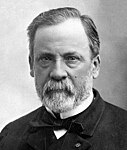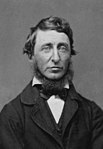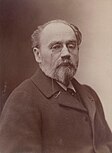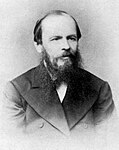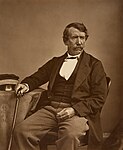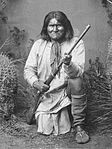
19th century
The 19th century began on 1 January 1801 (represented by the Roman numerals MDCCCI), and ended on 31 December 1900 (MCM).
For other uses, see 19th century (disambiguation).
The 19th century was characterized by vast social upheaval. Slavery was abolished in much of Europe and the Americas. The First Industrial Revolution, though it began in the late 18th century, expanding beyond its British homeland for the first time during this century, particularly remaking the economies and societies of the Low Countries, the Rhineland, Northern Italy, and the Northeastern United States. A few decades later, the Second Industrial Revolution led to ever more massive urbanization and much higher levels of productivity, profit, and prosperity, a pattern that continued into the 20th century.
In the Middle East, it was an era of change and reform. The Islamic gunpowder empires fell into decline and European imperialism brought much of South Asia, Southeast Asia, and almost all of Africa under colonial rule. Reformers were opposed at every turn by conservatives who strove to maintain the centuries old Islamic laws and social order.[1] The century also saw the collapse of the large Spanish and Mughal Empires. This paved the way for the growing influence of the British, French, German, Russian, Austro-Hungarian, Italian, and Japanese Empires along with the United States. The British boasted unchallenged global dominance after 1815.
After the defeat of France in the Napoleonic Wars, the British and Russian Empires expanded greatly, becoming two of the world's leading powers. Russia expanded its territory to Central Asia and the Caucasus. The Ottoman Empire underwent a period of Westernization and reform known as the Tanzimat, vastly increasing its control over core territories in the Middle East. However, it remained in decline and became known as the sick man of Europe, losing territory in the Balkans and North Africa.
The remaining powers in the Indian subcontinent such as the Maratha and Sikh Empires suffered a massive decline and their dissatisfaction with the British East India Company's rule led to the Indian Rebellion of 1857, marking its dissolution. India was later ruled directly by the British Crown through the establishment of the British Raj.
Britain's overseas possessions grew rapidly in the first half of the century, especially with the expansion of vast territories in Canada, Australia, South Africa, India, and in the last two decades of the century in Africa. By the end of the century, the British controlled a fifth of the world's land and one-quarter of the world's population. During the post-Napoleonic era, it enforced what became known as the Pax Britannica, which had ushered in unprecedented globalization on a massive scale.
Jiroemon Kimura (1897–2013) and Nabi Tajima (1900–2018), both Japanese, were the last man and woman respectively verified to have been born during the century.
Industrial revolution
European imperialism
July Monarchy, French Second Republic, Second French Empire, French Third Republic (France)
Bourbon Restoration
(Europe)
Belle Époque
(China)
Qing dynasty
(Vietnam)
Nguyen dynasty
dynasty (Korea)
Joseon
(South Africa)
Zulu Kingdom
Russian Empire
: United States more than doubles in size when it buys out France's territorial claims in North America via the Louisiana Purchase. This begins the U.S.'s westward expansion to the Pacific, referred to as its Manifest Destiny, which involves annexing and conquering land from Mexico, Britain, and Native Americans.
1803
– 1849: Sikh Empire is defeated in the Second Anglo-Sikh War. Therefore, the entire Indian subcontinent is under British control.
1848
: James Clerk Maxwell publishes On Physical Lines of Force, formulating the four Maxwell's equations.
1861
: Henri Becquerel discovers radioactivity; J. J. Thomson identifies the electron, though not by name.
1896
: The first permanent Reform Judaism congregation, the Neuer Israelitischer Tempel, is founded in Hamburg on October 18. Around the same time, through the development of Wissenschaft des Judentums, the seeds of Conservative Judaism are sown.
1818
: The Báb announces his revelation on 23 May, founding Bábism. He announced to the world of the coming of "He whom God shall make manifest". He is considered the forerunner of Bahá'u'lláh, the founder of the Baháʼí Faith.
1844
: Hong Xiuquan, the leader of the God Worshipping Society, founds the Taiping Heavenly Kingdom.
1851
–1870: The First Vatican Council is convened, articulating the dogma of papal infallibility and promoting a revival of scholastic theology.
1869
–1878: In Germany, Otto von Bismarck challenges the Catholic Church in the Kulturkampf ("Culture War")
1871
: Helena Blavatsky co-founds the Theosophical Society and becomes the leading articulator of Theosophy.
1875
: Mary Baker Eddy founds the Church of Christ, Scientist. The Watchtower, published by the Jehovah's Witnesses, releases its first issue.
1879
: In the Sudan, Muhammad Ahmad claims to be the Mahdi, founding the Mahdist State and declaring war on the Khedivate of Egypt.
1881
: Pope Leo XIII issues the papal encyclical Rerum novarum, the first major document informing modern Catholic social teaching.
1891
: Théodore Géricault paints his masterpiece The Raft of the Medusa, and exhibits it in the French Salon of 1819 at the Louvre.
1819
: Jules Verne begins publishing his collection of stories and novels, Voyages extraordinaires, with the novel Cinq semaines en ballon.
1863
: Leo Tolstoy publishes War and Peace.
Auguste Renoir, Bal du moulin de la Galette, 1876, Musée d'Orsay
1869
: The Battle of Trafalgar eliminates the French and Spanish naval fleets and allows for British dominance of the seas, a major factor for the success of the British Empire later in the century.
1805
Timelines of modern history
Long nineteenth century
19th century in film
19th century in games
19th-century philosophy
Nineteenth-century theatre
International relations (1814–1919)
List of wars: 1800–1899
Victorian era
France in the long nineteenth century
History of Spain (1808–1874)
History of Russia (1855–1892)
Slavery in the United States
Timeline of 19th-century Muslim history
Timeline of historic inventions
Langer, William. An Encyclopedia of World History (5th ed. 1973); highly detailed outline of events
online free
Morris, Richard B. and Graham W. Irwin, eds. Harper Encyclopedia of the Modern World: A Concise Reference History from 1760 to the Present (1970)
online frr
New Cambridge Modern History





